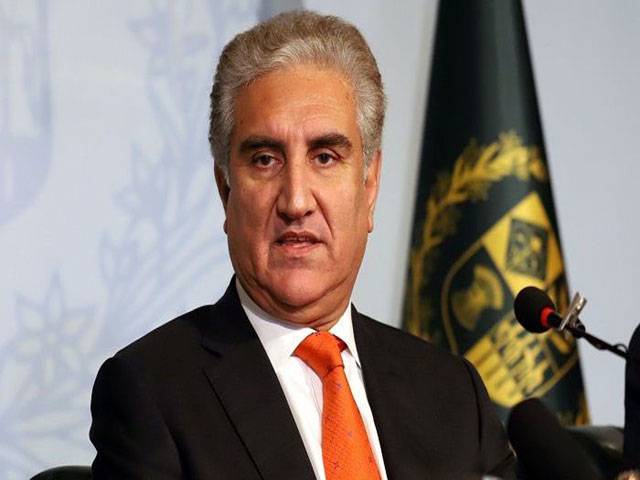ISLAMABAD - A Pakistan-backed peace deal between the Afghan Taliban and the United States is imminent amid Washington’s talks with Islamabad and Kabul, top officials said yesterday.
Foreign Minister Shah Mehmood Qureshi said that Pakistan had supported the Afghan peace process as it was in the in Pakistan and region’s interest.
“Nobody wants peace in Afghanistan more than us (Pakistan). We are hopeful of an early peace deal (between the US and the Afghan Taliban). The US acknowledges our efforts,” he told The Nation.
Foreign Office spokesperson Aisha Farooqui said that Pakistan had been backing the peace efforts in Afghanistan without any bias. “We respect Afghanistan’s sovereignty and want a solution that is acceptable to all,” she said.
The spokesperson said that the recent talks between Pakistan and the US had been positive and the trust level had gone up considerably.
Pakistan arranged the US-Taliban talks even after US President Donald trump called off the dialogue late last year. Islamabad insisted use of power will only complicate the issue.
As part of the consultations, US Special Representative for Afghanistan Reconciliation Zalmay Khalilzad had visited Islamabad on January 31. In his meetings with Chief of Army Staff General Qamar Javed Bajwa, Foreign Minister Shah Mehmood Qureshi and other government officials, Ambassador Khalilzad discussed US efforts to facilitate a political settlement to end the war in Afghanistan.
“He welcomed Pakistan’s ongoing efforts to support a reduction in violence that will pave the way for a US-Taliban agreement, intra-Afghan negotiations, and a comprehensive and permanent ceasefire in support of a sustainable peace,” said a US embassy statement.
Khalilzad also continued to emphasize the economic and security benefits that a lasting peace can bring to the region, it adde. Yesterday, a United Nations’ report
endorsed Pakistan’s stand about being victim of cross-border terrorism emanating from Afghanistan. The report by Monitoring Team of UN Security Council Committee overseeing sanctions against Al-Qaeda and Da’esh expressed concern over the growth of terror outfits in Afghanistan and their impact on the region.
Pakistan has consistently maintained that certain terrorist elements have been targeting Pakistan from their bases in Afghanistan.
The Monitoring Team specifically mentioned that Tehrik-e-Taliban and Jamaat-ul-Ahrar regularly attack Pakistani border posts from their bases in Afghanistan. The report recognised the effective actions taken by Pakistani security forces against terrorism.
Yesterday, Zalmay Khalilzad told Afghan President Ashraf Ghani that he was hopeful of reaching an understanding with the Taliban on reduction of hostilities, but did not offer any timeframe. According to Ghani’s office, Khalilzad hoped the peace talks to end the 18-year war will reach a conclusion.
“We are waiting for a clear response from the Taliban about a ceasefire or a significant and lasting reduction in violence based on a practical mechanism which is acceptable to the people of Afghanistan and the US government,” the Afghan presidential palace quoted Khalilzad as saying.
Afghan government leaders remain split on the issue of a brief ‘reduction in violence’ or a comprehensive ceasefire before a final agreement is reached between the US and Taliban.
Violent attacks in Afghanistan jumped to record levels in the last quarter of 2019 compared with previous years, according to a report by the Special Inspector General for Afghanistan Reconstruction.
There were 8,204 attacks between October and December last year, up from 6,974 in the same period in 2018 and the highest in the same quarter of any year since SIGAR recording began in 2010.
Stepped up bombings by the US and operations by CIA-trained Afghan special forces - several of which resulted in civilian casualties - have also been criticised by rights groups and some Afghan officials.
Last year, the US air force dropped 7,423 bombs on Afghanistan, up from 7,362 in 2018, according to the data provided by the US Central Command Combined Air Operations Center. In comparison, 4,361 bombs were dropped in 2017, while 2016 saw 1,337 such attacks, according to the data.
The United Nations blames the increased US bombings as one of the reasons for the rise in civilian casualties in Afghanistan. For the first time since the US-led invasion in 2001, the UN said Afghan government forces and its US allies killed more civilians in the first three months of last year than the armed groups.
Last month, Alice Wells, Acting Assistant Secretary of State for South and Central Asian Affairs, called on Foreign Secretary Sohail Mahmood here to discuss the bilateral issues and the Afghan peace.
Later, Prime Minister Imran Khan and US President Donald Trump held a meeting in Davos, Switzerland on the sidelines of the World Economic Forum.
Before the Khan-Trump meeting, Foreign Minister Qureshi had visited Washington to hold talks with his American counterpart Mike Pompeo.
Over the weekend the US changed its Travel Advisory for Pakistan and acknowledged that “Pakistan’s security environment has improved.” “This is a step in the right direction,” said Aisha Farooqui.






